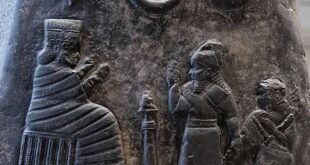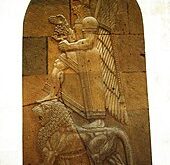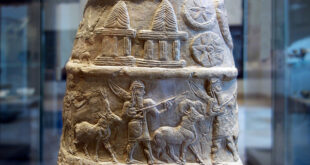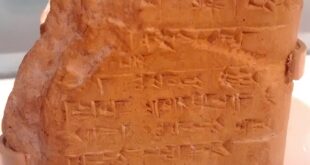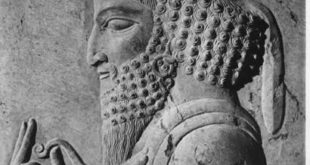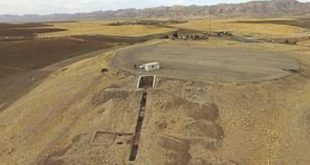It is thought that the Kassites originated as tribal groups in the Zagros Mountains to the north-east of Babylonia. Their leaders came to power in Babylon following the collapse of the ruling dynasty of the Old Babylonian Period in 1595 BC. The Kassites retained power for about four hundred years …
Read More »Hittite
Hittite, member of an ancient Indo-European people who appeared in Anatoliaat the beginning of the 2nd millennium BCE; by 1340 BCE they had become one of the dominant powers of the Middle East. Probably originating from the area beyond the Black Sea, the Hittites first occupied central Anatolia, making their …
Read More »Urartian originals
A modern depiction of the god Ḫaldi based on Urartian originals The Urartian pantheon seems to have comprised a diverse mix of Hurrian, Akkadian, Armenian, and Hittite deities.[75] Starting with the reign of Ishpuini, the Urartian pantheon was headed by a triad made up of Ḫaldi (the supreme god), Theispas (Teisheba, …
Read More »Kassite Art: Unfinished Kudurru
Artistic Exchange During the 2nd millennium, the region of Mesopotamia, with Assyria in the north and Babylonia in the south, together with Egypt and the Hittite lands in what is now modern Turkey, grew strong and exercised surprisingly harmonious political relations. For art, this meant an easy exchange of ideas and …
Read More »Hittite language
Hittite (natively 𒉈𒅆𒇷 nešili / “the language of Neša“, or nešumnili / “the language of the people of Neša”), also known as Nesite (Nešite / Neshite, Nessite), was an Indo-European language that was spoken by the Hittites, a people of Bronze Age Anatolia who created an empire centred on Hattusa, as well as parts of the northern Levant and Upper Mesopotamia.[1] The language, now long extinct, is attested in cuneiform, in …
Read More »History of the Medes (Median) empire
The Medes were an people of Aryan origin who inhabited the western and north-western portion of present-day Iran. By the 6th century BC (prior to the Persian invasion) the Medes were able to establish an empire that stretched from Aran (the modern-day Republic of Azerbaijan) to Central Asia and Afghanistan. Today’s population …
Read More »Lost city mystery solved as archaeologists decipher ancient clay tablets
The discovery of clay tablets in Iraqi Kurdistan has helped archaeologists unlock the mystery of an ancient lost city. The 92 clay tablets were unearthed last summer by archaeologists from Germany’s University of Tübingen during an excavation in the village of Bassetki. Stored in a pottery vessel and wrapped with …
Read More »The Skeletons of Shanidar Cave
A rare cache of hominid fossils from the Kurdistan area of northern Iraq offers a window on Neanderthal culture 1- in 1856, laborers working in a limestone quarry in the Neander Valley near Düsseldorf, Germany, dug up some unusual-looking bones. Subsequent study revealed that they belonged to a previously unknown …
Read More »Iraq’s Drought Exposed a 3,400-Year-Old Palace From the Mittani Empire
A team of German and Kurdish archaeologists have discovered a 3,400-year-old palace that belonged to the mysterious Mittani Empire, the University of Tübingen announced on Thursday. The discovery was only made possible by a drought that significantly reduced water levels in the Mosul Dam reservoir. “The find is one of the …
Read More »ANCIENT MYTHOLOGY AND KURDS. ARARAT OR JUDY?
Latif Mammad The Kurds, as the ancient inhabitants of Mesopotamia, are directly related to the spiritual heritage that had been accumulating for thousands of years, enriched and subsequently flowed into the spiritual treasury of humanity. The Kurdish people,during a long human evolution, as a genetic guide and a living book, …
Read More » History of Kurdistan
History of Kurdistan
